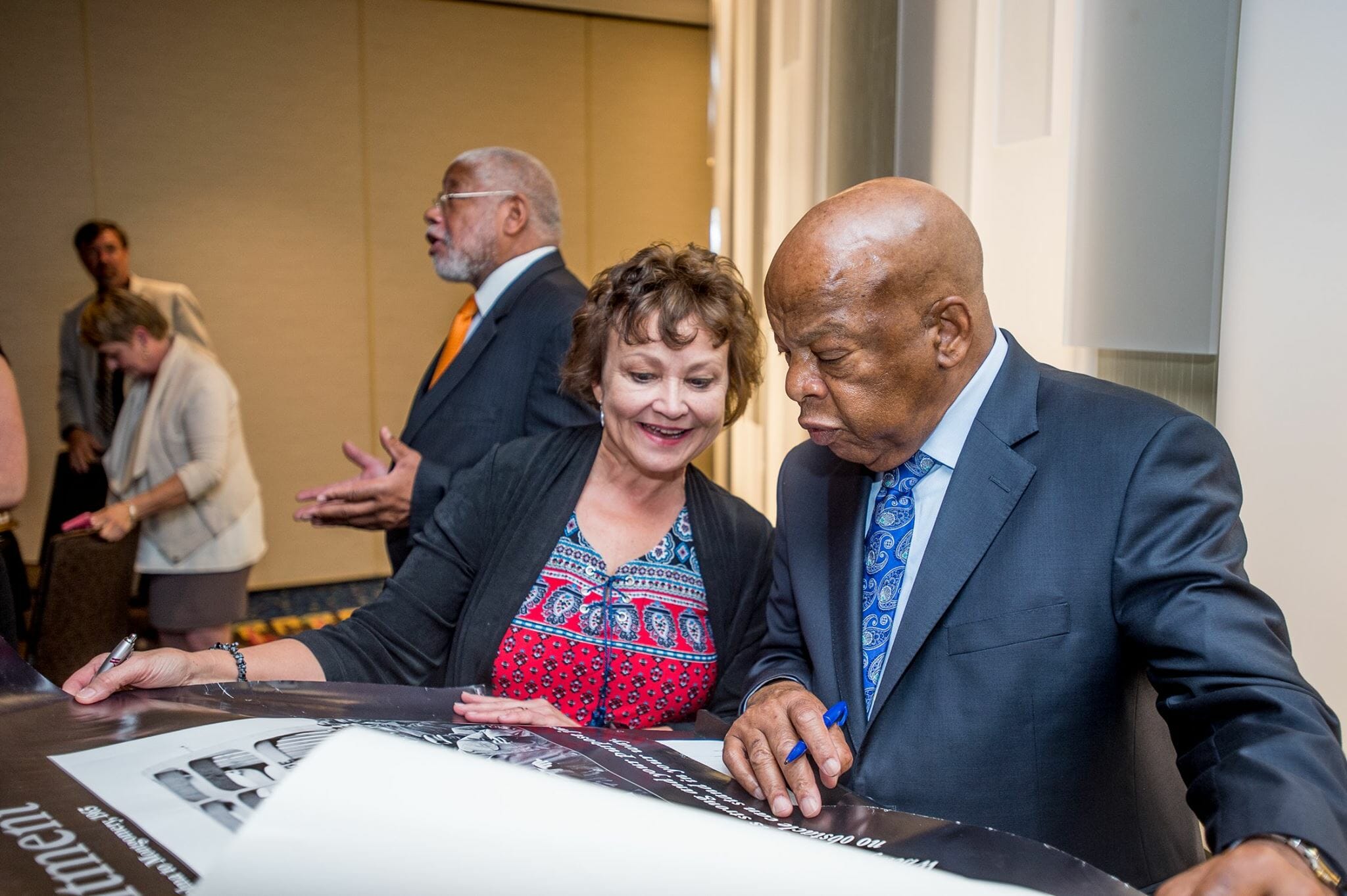
Laura Alden, publisher of Judson Press and member of the New Baptist Covenant board with Rep. John Lewis
Photograph curtosy of New Baptist Covenant
Ten years later, the New Baptist Covenant vision is still as needed as ever
Hannah McMahan
October 16, 2018
Sumter County, Georgia, was not remarkable. In fact, that is why it was chosen. In many ways, residents in this rural farming community in the
In accordance with the times, Sumter County was a highly segregated community that held to the strict racial codes of Jim Crow South. Residents worshipped and worked almost entirely separated from any neighbors who did not look like them. White residents were quite happy to keep it that way, and black residents saw so little hope of things changing.
That is until two new Baptist couples came to town.
In 1942, Mabel and Martin England and Florence and Clarence Jordan established Koinonia Farm. Koinonia was, and
The community set up this farm to be, as they described it, “a demonstration plot for the kingdom of God.”
Koinonia faced intimidation, boycotts
Sixty-six years later, another Baptist resident of Sumter County saw that the world around him was in desperate need of a new vision for the transformation of lives, churches
What if one of the nation’s oldest Christian traditions dug deep into its own past to work for healing, justice
At the end of January 2008, Baptists gathered in Atlanta to lift up the dream President Carter set before us and to establish the New Baptist Covenant. At this original meeting over 15,000 Baptists of different racial and theological backgrounds gathered to testify to their belief that we could do more for the cause of Christ by working together than we could separately. Here Baptists from Latino heritage joined with Baptists from African heritage, Asian heritage and European heritage to fellowship and worship together.
As a seminal event in Baptist life, the first gathering of the New Baptist Covenant was historic—not because this meeting marked a transition from injustice and division to reconciliation and unity, but because it showed us a vision of what could be if we were willing to put in the sweat equity to bring the vision into being.
As a seminal event in Baptist life, the first gathering of the New Baptist Covenant was historic—not because this meeting marked a transition from injustice and division to reconciliation and unity, but because it showed us a vision of what could be if we were willing to put in the sweat equity to bring the vision into being. It gave us a vision of what we, as a Baptist family, could be if we were willing to put our hands and feet behind the deepest desire of our hearts.
Inspired by this vision, the New Baptist Covenant set about bringing the spirit of this gathering to churches and communities around the nation. It established the Covenant of Action program through which local Baptist churches from different racial or ethnic backgrounds partner together in collaborative social justice missions. These partnerships not only help to reconcile our Baptist family but also advance justice in their communities.
Since the dawn of this work, covenant partner churches have crossed lines of racial division to stand together for prophetic justice causes. Covenant partners have worked together to fight for food justice, to combat predatory lending and to advance education, just to name a few efforts. All the while, these partners have faced head-on the painful history of racial injustice in our communities and in our churches.
In such a time as now, this work is needed more than ever. Our covenant partners often work in communities that are bitterly divided and overrun by racial injustice.
Therefore covenant partners become for their communities “demonstration plots for the kingdom of God.” Each set of partnered churches seeks to be faithful in their own way to the opportunities and responsibilities they have been given. While they work to serve their own communities and fight for justice in them, they also seek to demonstrate to the world what is possible.
This work doesn’t come without challenges. Sometimes a local response might feel too small in the face of the crushing needs of the world today. But we hold onto the lesson of the faithfulness of those who did the work to plant, tend and watch Koinonia Farm grow.
Our local work done with faith can and does bring forth glimpses of the kingdom of God. We truly believe that the change our world needs starts with your church.
Hannah McMahan is executive director, New Baptist Covenant.
The views expressed are those of the author and not necessarily those of American Baptist Home Mission Societies.

